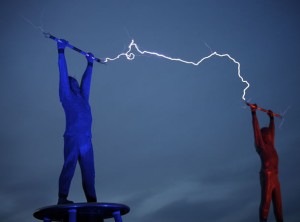From the Gospel according to Matthew:
When the crowds saw it, they were filled with awe, and they glorified God, who had given such authority to human beings.
(From the Daily Office Lectionary – Matthew 9:8 (NRSV) – June 5, 2014)
 Jesus healed a paralytic. More than that, he told him that his sins were forgiven! The scribes became irate, accusing Jesus of blasphemy. Jesus asked them, “Which is easier to tell him his sins are forgiven or to tell him to get up and walk?” As a demonstration of power and authority, Jesus did both.
Jesus healed a paralytic. More than that, he told him that his sins were forgiven! The scribes became irate, accusing Jesus of blasphemy. Jesus asked them, “Which is easier to tell him his sins are forgiven or to tell him to get up and walk?” As a demonstration of power and authority, Jesus did both.
And then this, Matthew’s description of the reaction of the crowd with that interesting plural ending. I’ve never noticed it until this morning. Matthew could have written “God had given authority to him” or “to a human being” or “to a man” or even “to Jesus.” But he didn’t. He wrote that God has “given such authority to human beings.” Plural.
I have grown someone distrusting of the New Revised Standard Version. In the effort to be non-sexist and inclusive in its language, the translation sometimes adds words or changes constructions from the original Greek. Often when, in the NRSV, one reads “brothers and sisters” the original Greek text merely says, “brethren;” the old use of the masculine plural to encompass all siblings or all humankind no longer being acceptable or understood, the translation enlarges the text to clarify the implication that all persons regardless of sex are included. In other places, it pluralizes singular constructions. I was convinced this would be such a case.
It’s not. The Greek words are toi anthropoi, “to men.” The NRSV correctly broadens the translation to a more comprehensive “human beings,” but the plural is original to the Greek.
What does this mean? A brief search through the online commentaries is unhelpful: they all focus on the power and authority given Jesus and overlook (as I have always done) Matthew’s use of the plural. Certainly, the Father has given this healing power and the authority to forgive sin to Jesus, but Matthew seems to be saying that it is not his alone. It has been given to everyone.
And if one stops to consider that, there is plenty of biblical warrant for such a statement. Just a couple of weeks ago in the Sunday Lectionary, in a reading from John’s Gospel, Jesus had said, “Very truly, I tell you, the one who believes in me will also do the works that I do and, in fact, will do greater works than these.” (Jn 14:12) After his Resurrection, he gave what is known as the “power of the keys” to the church in the Gospel lesson that will be read this Sunday, the Feast of Pentecost: “If you forgive the sins of any, they are forgiven them; if you retain the sins of any, they are retained.” (Jn 20:23; cf. Mt 16:19)
The authority to forgive sins and the power to heal have been given to us, to human beings. I wonder when we’ll realize that and begin to exercise them . . . .
====================
A request to my readers: I’m trying to build the readership of this blog and I’d very much appreciate your help in doing so. If you find something here that is of value, please share it with others. If you are on Facebook, “like” the posts on your page so others can see them. If you are following me on Twitter, please “retweet” the notices of these meditations. If you have a blog of your own, please include mine in your links (a favor I will gladly reciprocate). Many thanks!
====================
Father Funston is the rector of St. Paul’s Episcopal Church, Medina, Ohio.



Leave a Reply